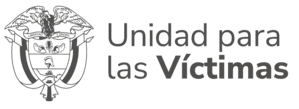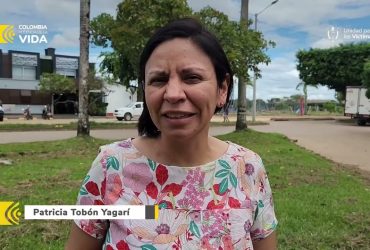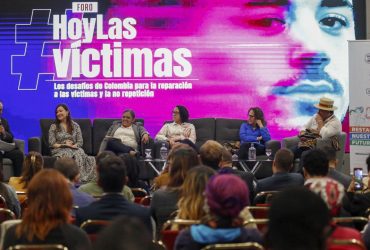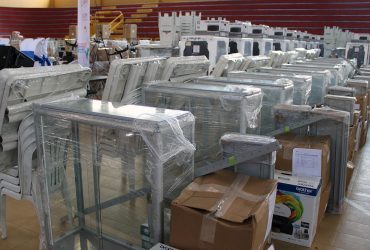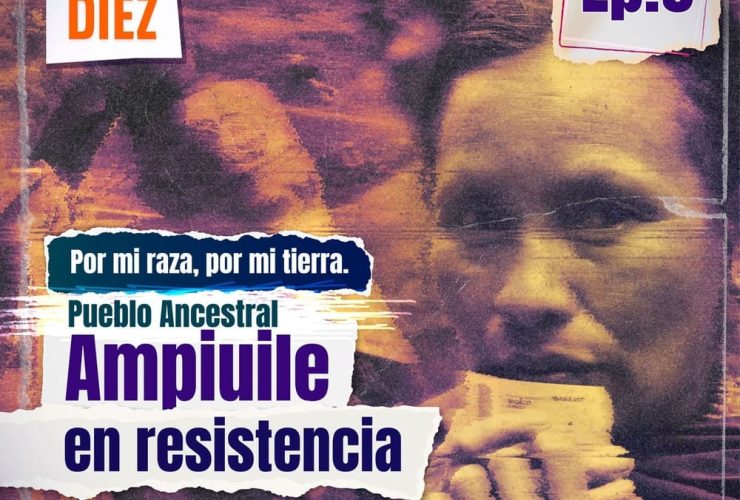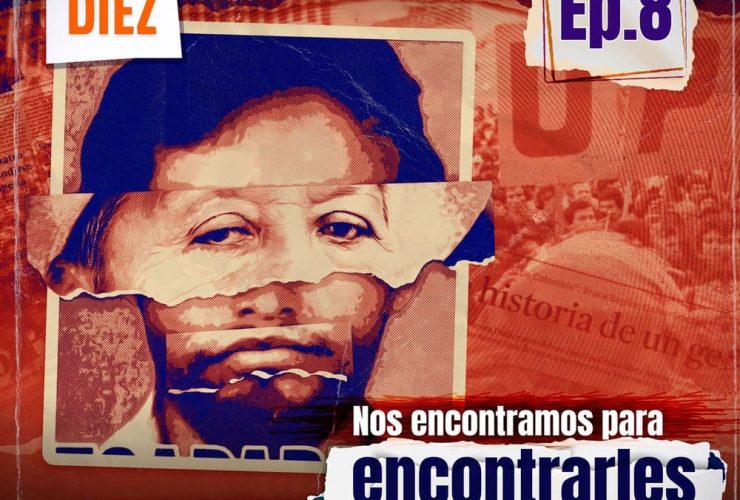From November 11 to 19 the Victims Unit, the Office in Colombia of the United Nations High Commissioner for Human Rights, the National Center for Historical Memory, the Attorney General’s Office and the Institute of Legal Medicine will participate in the Act Formal delivery of the dead of the massacre of May 2, 2002 in Bojayá, Chocó. The bodies were exhumed for the second time in May 2017 to achieve their identification.
More than 78 people were killed in the middle of an armed confrontation between Elmer Cárdenas Block of paramilitary groups of Colombia and members of Farc belonging to fronts 5, 34 and 57 of José María Córdova Mobile Block, when a pipette exploded in the center of the Catholic church of Bellavista, municipal seat of Bojayá, where the civil population was protected.
After 17 years of the massacre, the State achieved the identification of the bodies and agreed with the community to carry out a solemn act of dignification of their dead according to their uses and customs.
Victims Unit
In Bojayá, the Unit for Comprehensive Care and Reparation for Victims has three Collective Repair Subjects:
- The Afro Community of Bellavista, whose plan is in the implementation phase.
- The Community Councils of Bojayá composed of 19 Community Councils that are in the formulation phase.
- The Indigenous Communities of Bojayá, composed of 32 communities, which are in the implementation phase.
On December 6, 2015, during the act of recognition of responsibilities by the FARC to the community, the leaders of the Committee for the Rights of Victims of Bojayá stated that the exhumations, identification and dignified delivery were a priority for the community, within the framework of the Collective Reparation process that was being initiated by the State.
During the first half of 2016, the psychosocial team for accompaniment during the Search, Identification and Delivery of Dead Bodies of the Victims Unit, supported the institutional meetings and measured these dialogues. The Committee for the Victims of Bojayá formally requested the Unit to guarantee psychosocial support to families and the community during this process.
In that sense, the Unit for Comprehensive Care and Reparation for Victims has provided psychosocial support in prospecting, exhumations and delivery of information by Legal Medicine, in common agreement with the connoisseurs of the territory. Psychosocial support has been focused on the emotional and collective preparation of the process in general, in addition to informed decision-making by family members.
Following this work, the Unit has ensured the participation of family members in the eight assemblies of the process (approximately 200 family members in each space) and in the work tables and / or technical tables, as well as the participation of the Committee in spaces of institutional management, consultation and progress of the identification process.
Agreements during the final burial:
During the delivery process that begins on November 11, the Unit will guarantee the preparation to the families, prior to the technical-scientific explanations and the process in general, allowing family members to know and understand the type of information they will receive, for which the Unit has had 12 psychosocial professionals.
In order to meet the differential characteristics of this ethnic community, the Unit will guarantee the participation of the immediate family of the victims.
Likewise, the food of the community in general (2,000 people) will be covered, which will attend the public events of funeral and final burial. Likewise, the Unit will provide all the necessary materials for the symbolic acts planned by the community for the reception of the bodies in Bellavista and its route along the river, as well as the symbolic acts planned for the trip of the bodies to Pogue.
National Center for Historical Memory
The accompaniment and learning of the National Center for Historical Memory (CNMH) with the community of Bojayá, takes a long and deep journey. This began in the years 2009-2010, within the framework of Law 975 of 2005 of Justice and Peace, when the Historical Memory Group (GMH) of the National Commission of Reparation and Reconciliation (CNRR) produced the report “Bojayá. The War without Limits”.
This not only continues to be a fundamental reference, since it specified the magnitude of the damage that the armed conflict has caused to Afro and indigenous communities in the Middle Atrato region, but also established that the understanding of the impacts of war should address their special status as collective subjects.
Years later, with the enactment of Law 1448 of 2011 and Decrees Law 4633 and 4635, the GMH became part of the CNMH, entity within which the Ethnic Differential Approach team was created. From this, various strengthening processes were developed for the group of singers of the Pogue Community Council that led to the production, publication and dissemination of the “Pogue. A town, a family, a river”, from the song“. The job of singing memory ”and the documentary“ Las Musas de Pogue ”.
In turn, after the commemoration of May 2, 2016, the Committee for the Rights of Victims of Bojayá asked the CNMH Ethnic Approach team to accompany the process to be carried out by the Prosecutor’s Office and Legal Medicine from a historical memory perspective that will advance in the implementation of the guidelines established by the proposal “Atrato… territory of stories that builds its memory”.
Since 2017, the CNMH, through the Ethnic Approach team, has been advancing the process of “Family Stories and Family Albums in the community of Bojayá”. Through the Family Encounters as a methodological device, he has been rebuilding a family framework that dignifies and pays homage to his memory through the stories of theirs absent family members.
Together with the Committee for the Rights of Victims, local memory managers and the Local Communications Team, 40 commemorative family albums have been consolidated, which constitute a way to handle the pain of the community and will be delivered to them in the Act of spiritual farewell and burial next November.
Every time, the accompaniment of the CNMH to the community of Bojayá has been given under the principle of recognition of the right to truth and the historical memory guaranteed by: 1. The development of strengthening, construction, adaptation, maintenance, preservation and transmission processes of memories of the subregion of the Middle Atrato; 2. The recognition and strengthening of communities, authorities and ethnic-territorial organizations; 3. The understanding of Atrato people of the relations between the history of people, the long duration of conflicts and the historical conditions that produce marginalization and abuses; 4. The real commitment to truth, justice and guarantees of non-repetition; 5. Permanent reflection on the present and future of communities and territory.
Attorney General’s Office
In 2015, at the request of the families represented by the Committee for the Rights of Bojayá Victims, the documentation was analyzed and it was established that the exhumation work in 2002 was carried out in a responsible manner. It was also determined that the vast majority of the victims were identified through DNA collation, including their death was registered with the Notary’s Office of Bojayá by the Human Rights Prosecutor of the time.
The proposal was then raised that the exhumations be carried out only for purposes of dignified delivery and relocation of bone remains in the monument (mausoleum).
During the month of May 2017, the Search, Identification and Delivery of Missing Persons Group of the Transitional Justice Directorate, with the support of two ITC criminal teams, carried out the exhumation proceedings in the municipalities of Bellavista, Vigía del Fuerte and Pogue township; at the time that surveys were carried out in the municipality of Riosucio (Chocó), as well as inspection in the dump and around the school and old Bellavista church.
These proceedings carried out during 28 days were accompanied all the time by psychologists of the Victims Unit, members of the Historical Memory Center, representatives of the UN Human Rights. EQUITAS (forensic advisors of the Victims Committee of Bojayá) also participated.
All the bodies were sent by helicopter under the same conditions in which they found the National Institute of Legal Medicine and Forensic Sciences based in Medellín (Antioquia). For its part, the Office of the Attorney General of the Nation gave the Institute all the information it had, including the remnants and samples in the CTI Genetics Laboratory.
The process was permanently monitored by the representatives of the Committee for the victims of Bojayá, 7 Assemblies were held with Bojayá community and a significant number of inter-institutional meetings articulated in order to schedule the diligence of dignified delivery and burial of the Bone remains.
As a result of the identification process carried out by the National Institute of Legal Medicine and Forensic Sciences, 78 fully identified bodies will be delivered, symbolic delivery of 2 bodies that were not found, a pit called 75 corresponding to miscellaneous remains that could not to be associated with the other identified bodies, an unidentified body of an approximate minor between 4 and 8 years old, 9 babies who died in the womb of their mothers and 8 victims who are still missing.
In total 99 chests will be delivered that will be properly buried in a mausoleum built by the Ministry of Interior and Justice in the community of Bojayá.
Finally, within the framework of these events, the Office of the Attorney General continues in the process of searching for missing persons and guaranteeing the rights of victims.


